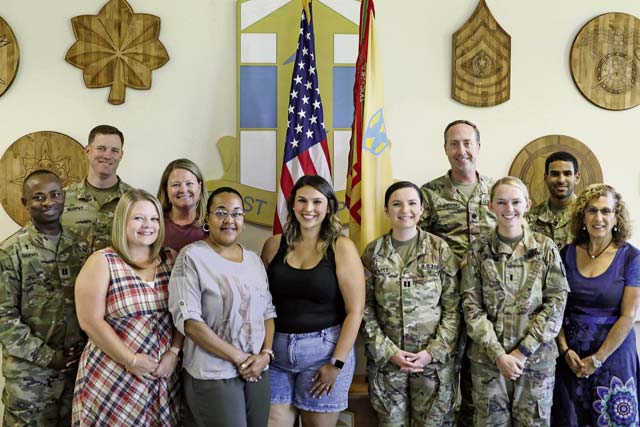
“Every spouse is entitled to a sponsor, just like the Soldier is,” said Judy Armstrong, Soldier Family Readiness Support Group Assistant, 21st Special Troops Battalion, 21st Theater Sustainment Command.
Spouse sponsorship gives incoming spouses a sense of belonging by connecting them with another person and the community. “Spouses don’t feel like they belong,” said Armstrong “That’s why it’s so important to have a sponsor because it helps connect them to the military community that they are a part of.”
Armstrong makes that connection when the Soldier provides their spouse contact information. Before arriving, spouses will talk with their sponsor and are given community resources and links. Upon arrival, spouses are gifted a USO welcome bag and have access to orientations and classes.
Natasha Pruett is a sponsor and enjoys connecting spouses to the overseas environment. “When you can network with likeminded [spouses] or people that have been in a similar situation, and communication builds, the relationship builds and they kind of come out of their shell,” said Pruett.
Spouses can feel overwhelmed with information when moving to Germany, and a spouse sponsor can ease the confusion and stress of the unknown throughout the transition.
“You’re not alone and things can get better,” said Pruett.
The 21st TSC Spouse Spon-sorship Program is volunteer only and is always working to grow new members.
“Now that you know what resources we have here in the KMC [Kaiserslautern Military Com-munity] area pass them on,” said Katie Thimsen, a spouse sponsor. Thimsen spon-sored two spouses this year and urges others to welcome and assist incoming families.
“Spouse spon–sors are there to meet those individual needs regardless of what they are,” said Armstrong. Most of the volunteering hours are spent answering questions about the arrival, what to expect, and family programs.
“The great thing about being a spouse sponsor, not only the benefits of networking and giving back and helping others, but they’re also gaining valuable work experience,” said Armstrong.
Spouse sponsors record their volunteer hours in the Volunteer Management Information System, which documents work experience useful for job applications. “I think that VMIS is a great way to log your hours for the time spent volunteering to be a spouse sponsor,” said Thimsen.
“They document all their volunteer hours, whether it’s sending an email, making a phone call, [or] going through the spouse sponsorship training,” said Armstrong.
Volunteer hours vary depending on how much support the incoming spouse requires. A spouse moving overseas for the first time may require more guidance than one returning, but a spouse sponsor is there for both, to provide connections and directions.
“It’s a two-way thing,” said Armstrong. “The spouse gets a lot out of it, so does the volunteer.”
The program falls under the SFRG, a Department of Defense policy, comprised of services to help Service Members and Families maintain readiness due to the unique challenges with military lifestyle, like relocation. The SFRG coordinates yearly events such as the Spring Extravaganza and Trunk-or-Treat, among many other command contributions to integrate Families and maintain unit cohesion.
To become a spouse sponsor or to learn more about the 21st Special Troops Battalion Spouse Sponsorship Program please visit https://www.facebook.com/groups/21ststbnewcomersupport.


